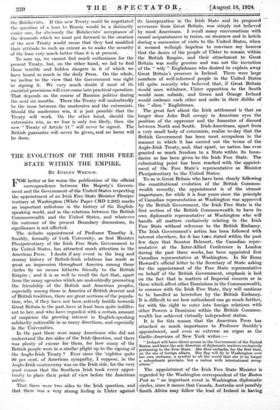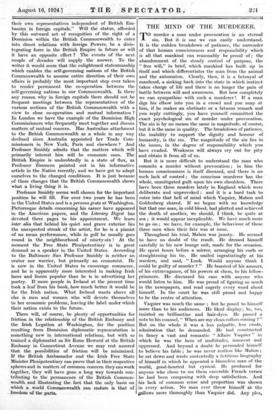THE EVOLUTION OF THE IRISH FREE STATE WITHIN THE EMPIRE.
EY EVELYN WRENCH.
FOR better or for worse the publication of the official correspondence between His Majesty's Govern- ment and the Government of the United States respecting the appointment of an Irish Free State Minister Plenipo- tentiary at Washington (White Paper CMD 2,202) marks an important milestone in the history of the English- speaking world, and in the-relations between the British Conunonwealth and the United States, and whatever the outcome of the present Boundary discussions, its significance is not affected.
The definite appointment of Professor Timothy A. Smiddy, formally of Cork University, as first Minister Plenipotentiary of the Irish Free State Government to the United States, has attracted much attention in the American Press. I doubt if any event in the long and stormy history of British-Irish relations has made as great an impression throughout America among those circles by no means hitherto friendly to the British Empire; and it is as well to recall the fact that, apart from the many agencies which are undoubtedly promoting the friendship of the British and American peoples, especially among those in America of British descent and of British tradition, there are great sections of the popula- tion, who, if they have not been actively hostile towards Great Britain in the past, have at least been quite indiffer- ent to her, and who have regarded with a certain amount of suspicion the growing interest in English-speaking solidarity noticeable in so many directions, and especially in the Universities.
In the past there were many Americans who did not understand the two sides of the Irish Question, and there was plenty of excuse for them, for how many of the British people were in a similar plight up to the signing of the Anglo-Irish Treaty ? Ever since the 'eighties quite 90 per cent. of American sympathy, I suppose, in the Anglo-Irish controversy was on the Irish side, for the very good reason that the Southern Irish took every oppor- tunity to place their point of view before the American Public.
That there were two sides to the Irish question, and that there was a very strong feeling in Ulster against its incorporation in the Irish - State and its proposed severance from Great Britain, was simply not believed by most Americans. I recall many conversations with casual acquaintances in trains, on steamers and in hotels during a succession of visits to the United States, when it seemed wellnigh hopeless to convince my hearers that the desire of the people of Ulster to remain within the British Empire, and their attachment to Great Britain was really genuine and was not the invention of the " wily " Englishman who desired to explain away Great Britain's presence in Ireland. There were large numbers of well-informed people in the United States till quite recently who believed that, if Great Britain would once withdraw, Ulster opposition to the South would soon subside, and Green and Orange Ireland would embrace each other and unite in their dislike of the " alien " Englishman.
The great fact about the Irish settlement is that no longer does John Bull occupy in American eyes the position of the oppressor and the fomentor of discord between North and South. Irish-Americans, apart from a very small body of extremists, realize to-day that the British Government has been most scrupulous in the manner in which it has carried out the terms of the Anglo-Irish Treaty, and, that apart, no nation has ever granted so much freedom to a State within its boun- daries as has been given to the Irish Free State. The culminating point has been reached with the appoint- ment of the Free State's representative as Minister Plenipotentiary to the United States.
To us in Great Britain who have been closely following the constitutional evolution of the British Common- wealth recently, the appointment is of the utmost importance, for while it is four years since the principle of Canadian representation at Washington was approved by the British Government, the Irish Free State is the first section of the British Commonwealth to have its own diplomatic representative at Washington who will handle all matters exclusively relating to the Irish Free State without reference to the British Embassy. The Irish Government's action has been followed with interest elsewhere, for it has teen stated within the past few days that Senator Belcourt, the Canadian repre- sentative at the Inter-Allied Conference in London during the past three weeks, has been appointed first Canadian representative at Washington. In Sir Esme Howard's official letter to the Secretary of State asking for the appointment of the Free State representative on behalf of the British Government, emphasis is laid on the fact that in matters of Imperial concern or in those which affect other Dominions in the Commonwealth, in common with the Irish Free State, they will continue to be handled as heretofore by the British Embassy. It is difficult to see how nationhood can go much further, for with the right to enter into foreign relations with other Powers a Dominion within the British Common- wealth has achieved virtually independent status.
It is for this reason that the American Press has attached so much importance to Professor Smiddy's appointment, and even so extreme an organ as the Gaelic-American of New York writes :— "Ireland will have direct access to the Government of the United States, and have the sole direction of diplomatic matters exclusively pertaining to the Free State. She thus embarks, for the first time, on the sea of foreign affairs. Her flag will fly in Washington over her own embassy, a symbol to all the world that she is no longer a subordinate province, but a nation with international recog- nition."
The appointment of the Irish Free State Minister is regarded by the Washington correspondent of the Boston Post as "an important event in Washington diplomatic circles, since it means that Canada, Australia and possibly South Africa may follow the lead of Ireland in having their own representatives independent of British Em- bassies in foreign capitals." Will the status, afforded by this outward act of recognition of the right of a Dominion within the British Commonwealth to enter into direct relations with foreign Powers, be a disin- tegrating force in the British Empire in future or will it have an opposite effect ? The events of the next couple of decades will supply the answer. To the writer it would seem that the enlightened statesmanship which enables the self-governing nations of the British Commonwealth to assume entire direction of their own affairs is probably the most important step ever taken to render permanent the co-operation between the self-governing nations in our Commonwealth. Is there any reason why in foreign capitals there should not be frequent meetings between the representatives of the various sections of the British Commonwealth with a view to close co-operation and mutual information ? In London we have the example of the Dominion High 'Commissioners who frequently meet together and discuss matters of mutual concern. Has Australian attachment to the British Commonwealth as a whole in any way declined since Australia appointed her Trade Com- missioners in New York, Paris and elsewhere ? And Professor Smiddy admits that the matters which will primarily interest him will be economic ones. The British Empire is undoubtedly in a state of flux, as Professor Zimmem pointed out in his informative article in the Nation recently, and we have got to adapt ourselves to the changed conditions. It is just because of these changes that the British Commonwealth shows what a living thing it is. .
Professor Smiddy seems well chosen for the important 'position he will fill. For over two years he has been in the United States and is a persona grata at Washington. ;Picturesque details concerning his career have appeared in the American papers, and the Literary Digest has devoted three pages to his appointment. We learn inter alia that behind his quiet and grave exterior lies the unexpected streak of the artist, for he is a pianist of no mean performance, while in golf he usually goes round in the neighbourhood of ninety-six ! At the moment the Free State Plenipotentiary is in great demand as a speaker in the United States. According to the Baltimore Sun Professor Smiddy is neither an orator nor warrior, but primarily an economist. He is now in the United States to encourage commerce, and he is apparently more interested in making Irish laces and linens popular than he is in advertising her poetry. If more people in Ireland at the present time took a leaf from his book, how much better it would be for the Irish nation. What Ireland wants above all 'else is men and women who will devote themselves to her economic problems, leaving the label under which their nation exists to the future.
There will, of course, be plenty of opportunities for friction in the relationship of the British Embassy and the Irish Legation at Washington, for the position resulting from Dominion diplomatic representation is something new in international relations, but with so trained a diplomatist as Sir Esme Howard at the British Embassy in Connecticut Avenue we may rest assured that the possibilities of friction will be minimized. If the British Ambassador and the Irish Free State Minister Plenipotentiary can prove that in their respective spheres and in matters of common concern they can work together, they will have gone a long way towards con- tributing to the permanence of the British Common- wealth and illustrating the fact that the only basis on .which a world Commonwealth can endure is that of .freedom of the parts.



































 Previous page
Previous page